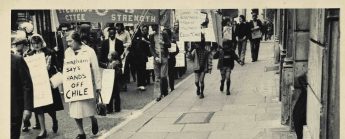Modern British Studies at Birmingham are delighted to announce its new research resource: ‘Modern British Subby’ a state of the art deepwater research vessel. Including a fully functioning multibeam echosounder system for hydrographic and habitat surveys as well as a deepwater capacity ipod dock, this will allow the centre to continue its cutting-edge explorations into the British past while listening to killer tunes beneath the ocean.
MBS’ new under-ocean research craft – the second addition to the MBS fleet after the 17.5 foot Explorer-HV expedition kayak which Dr David Gange has been using for his project on Britain’s Frayed Atlantic Edge – will aid us in our aspiration to find new ways of thinking about British society, culture, politics and economics from the eighteenth century onwards.

Modern British Subby in Action: Here piloted by MBS Fleet Commander Dr Chris Moores alongside historian of nautical trade Dr Kate Smith.
In keeping with our cross-department interest in histories of mobility, endangerment and the environment we believe that ‘seeing like a sub’ will allow us to appreciate what Britain looked like from the ocean floor, allowing us to reflect on Britain’s connections to the wider world through the excavation of techniques and conventions of underwater planning via the interrogation of Britain’s historic transnational cable routes.

The first edition to our fleet: David Gange’s kayak.
Inspired by Michel Callon’s work on the scallops of Saint-Brieuc Bay, we wish to understand how non-human, sub-aquatic forces created Modern Britain; fish, crabs and seals have shaped Modern Britain and we wish to know more about their historic agency and the stories they can tell. Here Birmingham’s oral historians will be pioneering non-anthropocentric oral history techniques while working within and around the submarine.
‘In this world, headwinds are far more prevalent than winds from astern’. Building on such a notion and working in the established practice of Melville (London, 1851), we respond to the signing of Article 50, by stressing historic connections between Britain and mainland Europe. By restoring Doggerland from the enormous condescension of the North Sea, we hope to further demonstrate Britain’s connectivity to the Continent and suggest hidden depths to a history which is all too often told as an ‘Island Story’.
Most importantly given our long-standing interest in object-oriented history and the history of loss, we hope to find and explore many ship-wrecks with treasure and, building on our track record of delivering dialogues with the dead, interview any ghostly piratical skeletons discovered in this process.
As Fernand Braudel wrote, ‘the sea itself, the one we see and love is the greatest document’: it’s time we learnt to read this. If nothing else our new resource will allow us to keep warm below the storm in our little hideaway beneath the waves.
Our ‘Modern British Subby’ – named ‘Subby McHistory McSubface’ is currently moored up in the Worcester-Birmingham canal alongside Protium, the University of Birmingham’s Hydrogen-powered canal boat. We are working out how to best navigate our new vehicle seawards and look forward to updating you on our progress as we make it.

Fare thee well poor devil of a Sub-Sub, whose commentator I am.
